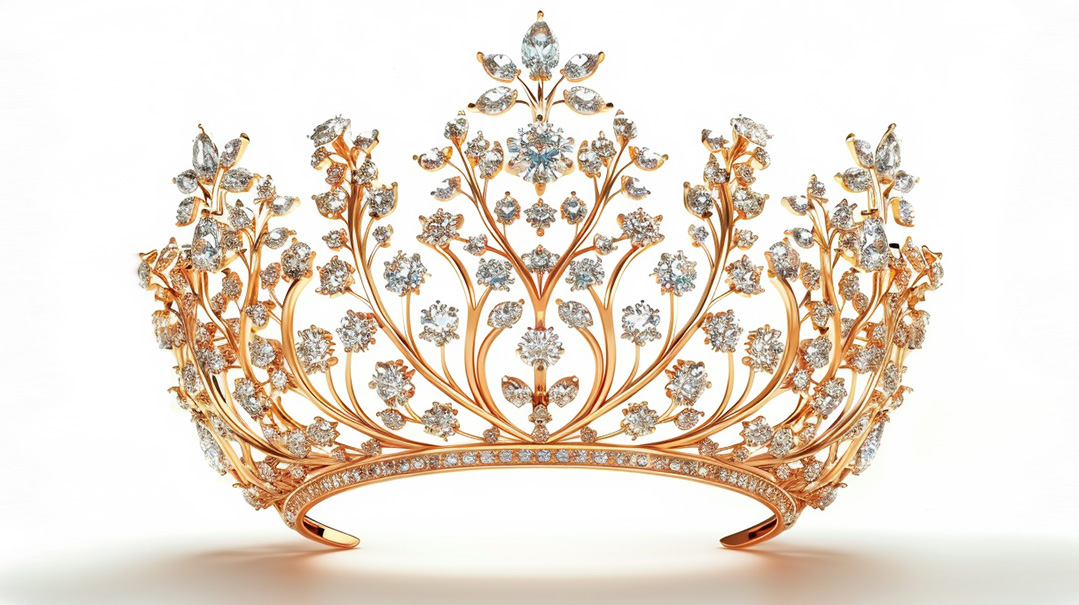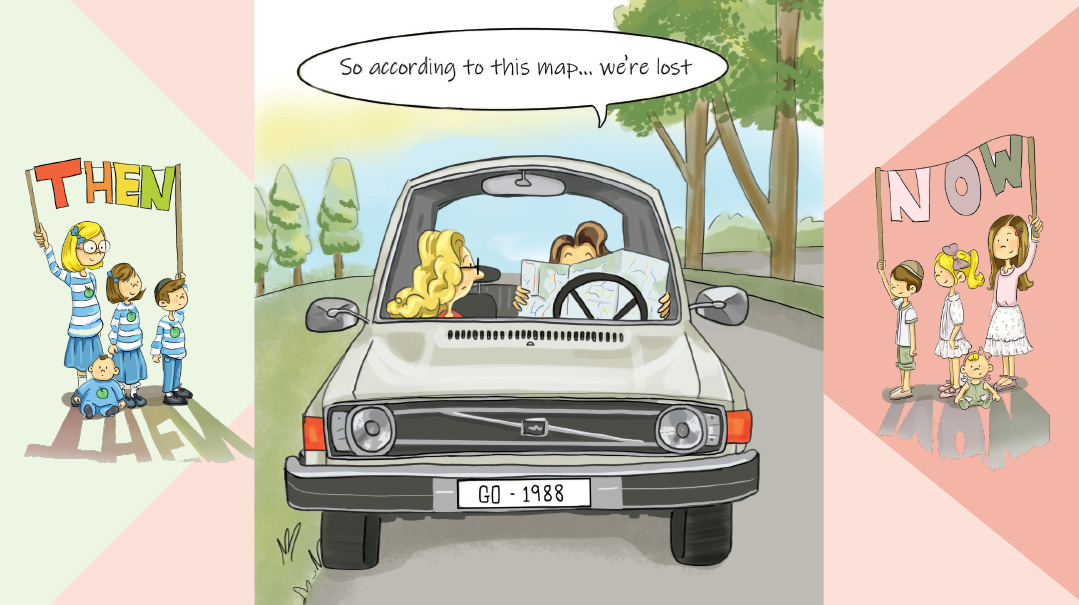Choose Joy

Always laughing, always teaching, always learning, Rebbetzin Temi Kamenetsky brought thousands closer to Torah

A Century of Torah
Temah Kamenetsky was born in New York to Reb Mordechai and Charna Raizel Brooks. Her father, a chazzan, was a diamond merchant who used to hire poor immigrants as gem cutters. The “greeners” didn’t know the trade, though, and their work was often subpar. Reb Mordechai would return to the office after hours to redo their work, never letting them know he was hiring them simply as a form of charity.
Temi attended public school, supplemented by private lessons, and then Rebbetzin Vichna Kaplan’s seminary.
As a child, she once suffered an ear infection. As she underwent a painful medical procedure to drain her ears, her father cried at the sight of his daughter’s pain. Though in agony herself, young Temi squeezed her father’s hand and comforted him, “Tatteh, veint nisht — don’t cry.” If it was from the Eibeshter, then it was good.
When Rabbi Brooks heard that a talmid chacham, Rav Yaakov Kamenetsky, would be arriving from Toronto to join the hanhalah of Yeshiva Torah Vodaath, he quickly arranged to vacate his apartment to provide a place for the Kamenetsky family. Leaving behind a set of candlesticks, he told Rav Yaakov to enjoy them. Sometime later, the Kamenetskys presented the same candlesticks to a beaming Temi Brooks upon her engagement to their son Shmuel.
The shidduch had been suggested by Avraham Zelig Krohn (the father of lecturer Rabbi Paysach Krohn), who had been roommates with Rav Shmuel in Ner Israel, and was now a neighbor of the Brooks family.
The young couple settled in Lakewood, where the chassan had been learning. In the early 1950s, he went, with Rav Aharon Kotler’s blessing, to assist Rav Simcha Wasserman with the yeshivah he had opened in Los Angeles. During the L.A. period, Rebbetzin Temi remained in Williamsburg with her in-laws. On the second day of Shavuos, Rav Yaakov brought his daughter-in-law to the hospital to give birth to her second child, Avraham; Rav Shmuel returned in time for the bris.
Soon, the Kamenetskys moved to Philadelphia, where Rav Shmuel founded Talmudical Yeshiva of Philadelphia, partnering with Rav Dov Schwartzman. (Rav Schwartzman soon relocated to Israel, and the Kamenetskys were joined by Rav Elya Svei and his family.)
A Conservative stronghold, Philadelphia had minimal kosher amenities and no cheder or Bais Yaakov. The growing and rambunctious Kamenetsky brood — seven of whom were born in seven and a half years — attended the local mixed day school, and had a limited pool of like-minded friends. The family’s harbatzas Torah wasn’t universally appreciated; a sixth-grade teacher summed up the attitude of certain segments of the community when he snapped at one of the young girls, “Your father’s a faker!”
A well-meaning acquaintance offered the family a TV to help the Rebbetzin entertain her many children. Though children’s programming was fairly innocuous in those days, it was a line the Rebbetzin wouldn’t cross, and instead she spent years playing, listening, and reading to her children on her own, until the community came of age and the house filled up with their friends.
The family’s first home was far from the yeshivah. Rav Shmuel would take two buses and a trolley daily, and on Shabbos — when the walk was an hour each way — he’d sometimes leave for Shacharis and come home for Havdalah, with the Rebbetzin holding down the fort all day. (Caring husband and father that he was, when the schedule allowed, Rav Shmuel would get the kids up and out to the bus stop himself so the Rebbetzin could rest. On Shabbos mornings, they’d take a walk past the nearby fire station and watch for fire engines.)
When the 11th and youngest Kamenetsky, Eliyahu, was born with Down syndrome, there were no chesed organizations or special schools to step in and offer help. Rebbetzin Kamenetsky attended school with him daily for years, essentially serving as his shadow.
Forever Learning
Rebbetzin Kamenetsky, or Tante Temi, as she asked people to call her, was a lifelong student. She believed strongly that women need to maintain a vibrant connection to Torah throughout their lives. She’d encourage her bas-mitzvah-age granddaughters to learn shemiras halashon, and encouraged women of all ages to find whichever type of book, sefer, or shiur appealed to them and kept them inspired.
She possessed a keen and inquisitive mind, and despite not having received a full Bais Yaakov education, knew tremendous amounts of Torah. A letter she wrote to her then-chassan during her engagement asks what she should learn next, having just completed Iyov and Mishlei as per his suggestion.
In later years, a great-nephew listened as she tried to convince Rav Shmuel that the tzibbur had not been yotzei krias haTorah, since the baal korei had substituted a pasach for a kamatz in the words “dam naki,” significantly changing the meaning of the text.
Still, the impact she had on thousands of women didn’t come primarily from the breadth and depth of her learning; it was her personal example and rock-solid faith.
Esther Rayman, of Lakewood, first heard about Rebbetzin Kamenetsky from a friend. Spontaneously, Mrs. Rayman then offered a tefillah: “Hashem, I also need a rebbetzin in my life!” Just a couple of weeks later, at a bar mitzvah, her friend pulled her over to introduce her to another guest — it was Rebbetzin Kamenetsky, of course.
“I went over, we schmoozed, I asked her questions about everything — chinuch habanim, shalom bayis, everything. I felt so connected, she was so authentic,” remembers Mrs. Rayman. “I said, ‘Can I ask you a chutzpahdig question? Can we learn with you every week?’ Rebbetzin Kamenetsky said, ‘We can try.’ We’ve been trying for 22 years now.”
By the time of the Rebbetzin’s petirah, those weekly learning sessions had morphed into a teleconference with participants spanning the English-speaking world.
Mrs. Rayman once met a woman who confided that she sometimes doubted Hashem’s love for her. After all, said the woman, there are times she doesn’t feel love toward her children — who says Hashem always loves her? “You can ask that because you aren’t learning with Rebbetzin Kamenetsky,” Mrs. Rayman answered. And soon enough, the woman joined the weekly shiur and began to feel the love.
The learning was never abstract or dry. Though nominally text-based — often on an English language sefer like those of the Chofetz Chaim Heritage Foundation or mussar classics like Mesillas Yesharim or Orchos Tzaddikim — the impact was Rebbetzin Kamenetesky’s powerful, heartfelt words and example.
She taught her family and friends to feel the closeness of Hashem’s Presence. “She would teach us that when leaving the house, we should kiss the mezuzah and say, ‘Hashem shomri, Hashem tzili al yad yemini, [paraphrasing the passuk in Tehillim 121:8]’” recalls one student. If someone ever wondered if her needs were too minute to bother davening for, the Rebbetzin would insist that there is nothing that gives Hashem more pleasure than giving to His children. She’d encourage people to say, “Thank you, Hashem, and please, more!”
If someone reported good news, like a birth or engagement, and asked, “Can you believe it?” the Rebbetzin’s answer was invariably an indignant, “Well, of course! Hashem is completely good; why would you be surprised?”
The Kamenetskys themselves weren’t blessed with children for the first three years of their marriage, which was challenging. Still, several acquaintances heard from the Rebbetzin that, in her absolute confidence in Hashem’s beneficence, she never once doubted they would build a family.
She didn’t believe in preaching about tzniyus; if a person knew how much Hashem loved her, she felt, tzniyus would be the natural result of internalizing that love.
One constant theme was an idea she’d learned from Rav Shmuel years before, during their engagement. She’d made a comment to the effect of, “What can I do? That’s my nature.” Her chassan replied that only animals are incapable of changing their innate nature. A person, Tante Temi would constantly remind others, can always rise above his baser self. Though gentle with others, she was a very strong person, constantly working on herself and demanding more.
A close friend of Mrs. Rayman was not yet keeping kosher when she first met the Rebbetzin. The Rebbetzin told her, “You have a holy neshamah, and holy neshamos need kosher food.” The woman believed her, and kept kosher from that day on.
Malky Schwartz, who heads the Bikur Cholim that services Philadelphia’s world-class hospitals, often brought patients or their parents to get chizuk from the Rebbetzin. “She became like a mother to so many baalos teshuvah,” she says, recounting one example after another of not-yet-frum women who were inspired to move closer to Torah after meeting the Rebbetzin.
A few times a year, the Rosh Yeshivah and Rebbetzin would visit a kiruv program program that their grandchildren, the Kaminskys, were involved with. The Rebbetzin would speak with the women, and would always be full of praise for the attendees.
“Look how they are thirsting for knowledge! Such good questions,” she’d say, remembers Mrs. Kaminsky. “ ‘Mi k’amcha Yisrael’ was her constant refrain.”
In fact, the last substantive words she uttered were the completion of that pasuk, “goy echad ba’aretz.”
A true learner, Pirkei Avos teaches, learns from everyone, in every area. Dovi Zauderer, a “hoiz bochur” in the Kamenetsky home, remembers that she once asked him to help replace a broken window screen. He apologized; he didn’t know how. “So go find a bochur who does,” she told him, “and you will learn for life how to repair a screen.”
Thinking of Others
Like her husband the Rosh Yeshivah, Tante Temi couldn’t ignore a ringing phone. If someone needed her, she was there, with her full attention. A granddaughter watched her answer the phone just a few minutes before lichtbentshen on a Friday afternoon. Her melodic “Hellooo?” was as calm and measured as always, and nothing in her tone indicated she might have been feeling rushed.
The Rebbetzin didn’t walk; she ran, a habit she jokingly attributed to needing to keep up with her husband, who is famously energetic. When visiting children or grandchildren, she’d rise early, daven slowly and carefully, and then get right to work, organizing, cleaning, moving furniture. One granddaughter remembers coming into her mother’s kitchen to find Bubbe, well into her eighties, standing on the counter to clean the upper cabinets.
In recent months, she began to focus on a particular message: If one never hurts another, she said, he will grow old with all his faculties intact. Her proof? Her husband, Rav Shmuel, whom she says she never saw get angry. (Her own mind remained clear until her death.)
She herself never said a bad word about another. Though she understood people and their foibles, the lens through which she viewed the world was a positive one. Even when she needed to convey a message, it was always framed in the positive. She wouldn’t say not to snap at your husband, she’d remind you to talk encouragingly. She wouldn’t warn someone not to be selfish, she’d encourage them to think of others.
Deena Zyskind, who hosted the Kamenetskys every year during their stay in Los Angeles, once visited the Rebbetzin in Israel with her seminary-aged daughter. As the Rebbetzin escorted them out, they asked for a brachah for the daughter to find a shidduch who would become a talmid chacham. “I vintsh you a shidduch who will be a baal middos,” answered the Rebbetzin.
They continued walking down another flight of stairs, and the girl tried again: “Thank you. And could I have a brachah that he’ll be a talmid chacham?”
Again, the Rebbetzin repeated her brachah for a chassan with middos tovos. When this repeated itself yet again, the girl asked, “But why won’t you give me a brachah that he should be a talmid chacham?”
The Rebbetzin replied, “If he doesn’t have middos tovos, the Torah he learns won’t be absorbed.” The foundation of all life, in her view, was middos; without that, there is nothing.
Living with Hashem
Some people live for Hashem; some live by His rules; but Rebbetzin Kamenetsky also lived with Hashem, says her grandson Yisroel Berkowitz. When he first got his driver’s license, he was eager to drive his grandmother to the store.
“Bubbe, you trust my driving?” he teased.
Rebbetzin Kamenetsky laughed her trademark infectious giggle. “Trust you? I trust Hashem!”
With the right mindset, she’d emphasize, everything becomes a mitzvah opportunity. When her son Eliyahu helped her up out of a chair, she’d remind him, “Be mechaven for mitzvas kibbud eim”; turning on the lights on Erev Shabbos meant a reminder to think about kavod Shabbos.
Torah was the source of her ideas and the soundtrack of her life. When describing how to rock a crying baby, she’d say, “Like doing the tenufah in the Beis Hamikdash”; when an acquaintance visited, excited at having achieved a new belt level in karate, she shared his joy by telling him, “Now you’ll be able to help Mashiach ben Yosef when he arrives to defeat the goyim!” Everything she did was accompanied by a maamar Chazal or passuk — not because she was preaching, but because those were her instinctive associations.
Her interest in wellness and healthy eating, years before it became trendy, was an outgrowth of her delight in Hashem’s creation. As she went about her daily life — say, dressing a salad — she’d ask a granddaughter, “How do we know olive oil is healthy?” The answer would be that Eretz Yisrael is praised for its olives, and of course Hashem wouldn’t laud an unhealthy food.
She was confident that Hashem’s creations were enough, in and of themselves, and didn’t need our improvements. Some nine years ago, the Rebbetzin broke her shoulder. The doctors were doubtful that an 80-year-old could fully recover from such an injury even with surgery, but she was adamant that it was unnecessary. She embarked on a regimen of excruciating exercise. During brief breaks to catch her breath, she’d exclaim, “Hashem is so good! Can you believe how He designed the body to heal its own issues? How amazing!”
After six months, the doctor was astonished to find the shoulder fully healed. “I see she is living on an entirely different madreigah of bitachon than I am,” said Rav Shmuel.
The Rebbetzin read voraciously. Mrs. Zyskind remembers that the Rebbetzin warned her of the dangers of plastic food containers years before scientists began to publicize the health risks of BPA. Still, the Rebbetzin was very clear about her priorities. Once, she told Mrs. Zyskind about a particular food she considered terribly detrimental. A short while later, the Kamenetskys were hosted by a local family who served that same dish.
“What did you do?” asked Mrs. Zyskind.
“Oh, a small piece won’t hurt anybody,” said the Rebbetzin. No matter her strongly held beliefs, kavod habriyos always came first.
At Her Husband’s Side
The Rebbetzin didn’t enter marriage expecting her husband to be the leader of an entire continent’s Jewry; she wanted a sincere ben Torah, and resolved to follow and support him wherever life took him.
Still, when the world found Rav Shmuel, Tante Temi never resented sharing her husband. A neighbor once called to speak to the Rosh Yeshivah. The Rebbetzin mentioned that he was eating, and began to pass the phone, but the caller protested; he’d call back later.
“Why? Does the Rosh Yeshivah eat with his ears?” asked the Rebbetzin.
The Kamenetsky house never had caller ID or call waiting, and the phone was never off the hook, even in the middle of the night.
For his part, the Rosh Yeshivah had enormous respect for her insight and opinions. When couples came to discuss shalom bayis, Rav Shmuel would often ask the Rebbetzin to sit in and share her thoughts.
Just a few weeks ago, a well-known lecturer on marriage called Rav Shmuel. She often taught in a public setting, and was seeking guidance regarding which topics were suitable to discuss in that format and which were better left to individual lessons. Rav Shmuel referred her to the Rebbetzin.
Speaking with the Rebbetzin, the lecturer found, that without ever having discussed the issue with her husband, the Rebbetzin’s opinions lined up exactly with various instructions the lecturer had received from Rav Shmuel over the years.
Many people who knew them remarked that even in their nineties, they looked for all the world like a couple in shanah rishonah. They still spoke to each other with the utmost respect, never taking the other for granted, and were clearly the best of friends.
The Rebbetzin didn’t put aside her own needs for the Rosh Yeshivah. In her utter selflessness, his comfort was her priority.
Choosing Joy
Tante Temi bubbled with an infectious joy, which sprang from her total emunah in Hashem’s goodness.
She constantly hummed and sang as she went about her tasks, and her daughters say that even mundane requests (please clear off the supper table!) were delivered in a cheerful singsong. “A friend once asked, ‘Why is your mother always singing?’ ”
Her happiness was a choice, but it was also the inevitable result of her boundless gratitude for everything she had. She liked to ask people: What one middah, if you could perfect it, would make the greatest difference in your life? She’d hear everyone’s suggestions, but then offer her opinion: hakaras hatov. When you recognize all the good Hashem does for us, and all the kindnesses of the people around us, your gratitude will make you a changed person. And she lived that ideal.
When she was in terrible pain from the illness that ultimately took her life, she didn’t complain. When asked how she was feeling, her immediate response was always, “Very grateful.” In her final days, when the pain was especially intense, she would wait a moment or two till the pain let up even a little bit, so she could honestly answer, “Right now is a little better.” The only thing you can change about a situation, she’d say, is your attitude. You can always choose joy. Things can’t always be great, but you can always be grateful.
(Originally featured in Mishpacha, Issue 777)
Oops! We could not locate your form.






